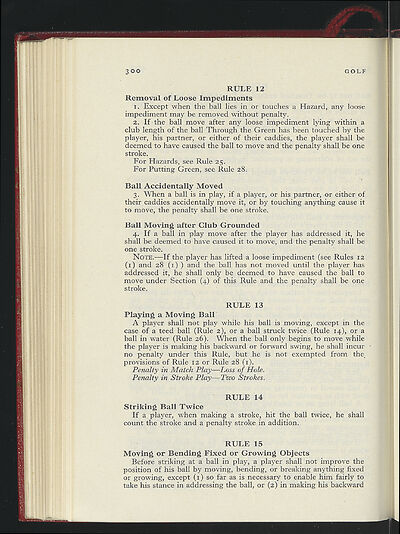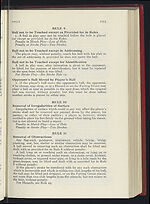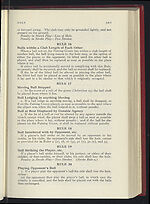1938-39
(324)
Download files
Complete book:
Individual page:
Thumbnail gallery: Grid view | List view

300 GOLF
RULE 12
Removal of Loose Impediments
i. Except when the ball lies in or touches a Hazard, any loose
impediment may be removed without penalty.
z. If the ball move after any loose impediment lying within a
club length of the ball Through the Green has been touched by the
player, his partner, or either of their caddies, the player shall be
deemed to have caused the ball to move and the penalty shall be one
stroke.
For Hazards, see Rule 25.
For Putting Green, see Rule 28.
Ball Accidentally Moved
3. When a ball is in play
;
if a player, or his partner, or either of
their caddies accidentally move it, or by touching anything cause it
to move, the penalty shall be one stroke.
Ball Moving after Club Grounded
4. If a ball in play move after the player has addressed it, he
shall be deemed to have caused it to move, and the penalty shall be
one stroke.
NOTE.—If the player has lifted a loose impediment (see Rules 12
(i) and 28 (z) ) and the ball has not moved until the player has
addressed it, he shall only be deemed to have caused the ball to
move under Section (4) of this Rule and the penalty shall be one
stroke.
RULE 13
Playing a Moving Ball
A player shall not play while his ball is moving, except in the
case of a teed ball (Rule 2), or a ball struck twice (Rule
14),
or a
ball in water (Rule 26). When the ball only begins to move while
the player is making his backward or forward swing, he shall incur
no penalty under this Rule, but he is not exempted from the.
provisions of Rule 12 or Rule 28
(I).
Penalty in Match Play—Loss of Hole.
Penalty in Stroke Play—Two Strokes.
RULE 14
Striking Ball Twice
If a player, when making a stroke, hit the ball twice, he shall
count the stroke and a penalty stroke in addition.
RULE 15
Moving or Bending Fixed or Growing Objects
Before striking at a ball in play, a player shall not improve the
position of his ball by moving, bending, or breaking anything fixed
or growing, except (i) so far as is necessary to enable him fairly to
take his stance in addressing the ball, or (2) in making his backward
RULE 12
Removal of Loose Impediments
i. Except when the ball lies in or touches a Hazard, any loose
impediment may be removed without penalty.
z. If the ball move after any loose impediment lying within a
club length of the ball Through the Green has been touched by the
player, his partner, or either of their caddies, the player shall be
deemed to have caused the ball to move and the penalty shall be one
stroke.
For Hazards, see Rule 25.
For Putting Green, see Rule 28.
Ball Accidentally Moved
3. When a ball is in play
;
if a player, or his partner, or either of
their caddies accidentally move it, or by touching anything cause it
to move, the penalty shall be one stroke.
Ball Moving after Club Grounded
4. If a ball in play move after the player has addressed it, he
shall be deemed to have caused it to move, and the penalty shall be
one stroke.
NOTE.—If the player has lifted a loose impediment (see Rules 12
(i) and 28 (z) ) and the ball has not moved until the player has
addressed it, he shall only be deemed to have caused the ball to
move under Section (4) of this Rule and the penalty shall be one
stroke.
RULE 13
Playing a Moving Ball
A player shall not play while his ball is moving, except in the
case of a teed ball (Rule 2), or a ball struck twice (Rule
14),
or a
ball in water (Rule 26). When the ball only begins to move while
the player is making his backward or forward swing, he shall incur
no penalty under this Rule, but he is not exempted from the.
provisions of Rule 12 or Rule 28
(I).
Penalty in Match Play—Loss of Hole.
Penalty in Stroke Play—Two Strokes.
RULE 14
Striking Ball Twice
If a player, when making a stroke, hit the ball twice, he shall
count the stroke and a penalty stroke in addition.
RULE 15
Moving or Bending Fixed or Growing Objects
Before striking at a ball in play, a player shall not improve the
position of his ball by moving, bending, or breaking anything fixed
or growing, except (i) so far as is necessary to enable him fairly to
take his stance in addressing the ball, or (2) in making his backward
Set display mode to:
![]() Universal Viewer |
Universal Viewer | ![]() Mirador |
Large image | Transcription
Mirador |
Large image | Transcription
| Games and sports in the army > 1938-39 > (324) |
|---|
| Permanent URL | https://digital.nls.uk/248740818 |
|---|
| Description | 'Games and Sports in the Army' was an annual publication produced by the British War Office between the 1930s and 1960s. This included the Second World War. It outlines the rules and regulations for games and sports played by members of the armed forces. It features names and photographs of team members, and examples of contemporary advertising. |
|---|---|
| Shelfmark | GWB.52 |

